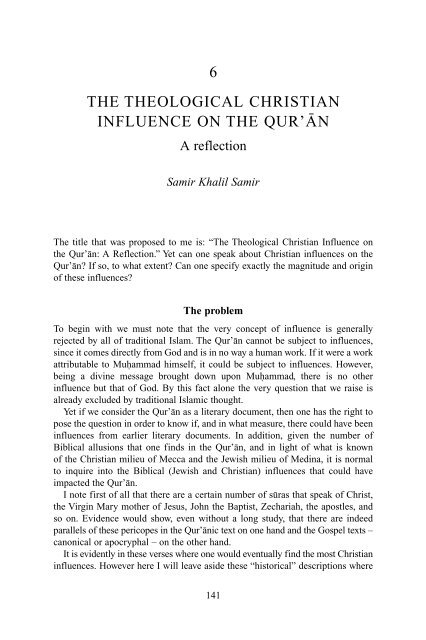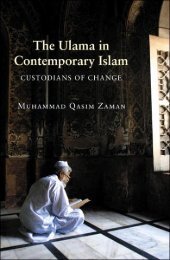- Page 3 and 4:
THE QUR’AN IN ITS HISTORICAL CONT
- Page 5 and 6:
THE QUR’AN IN ITS HISTORICAL CONT
- Page 7 and 8:
CONTENTS List of images vii Notes o
- Page 9 and 10:
IMAGES 1 Epitaph of Imru’ al-Qays
- Page 11 and 12:
CONTRIBUTORS Others Saw it (Princet
- Page 13 and 14:
FOREWORD Three decades ago, when a
- Page 15 and 16:
FOREWORD foundations of the Qur’a
- Page 17:
EGYPT Constantinople ANATOLIA Black
- Page 20 and 21:
GABRIEL SAID REYNOLDS meaning for a
- Page 22 and 23:
GABRIEL SAID REYNOLDS in kufischen
- Page 24 and 25:
GABRIEL SAID REYNOLDS beginning. It
- Page 26 and 27:
GABRIEL SAID REYNOLDS manuscripts i
- Page 28 and 29:
GABRIEL SAID REYNOLDS Of these theo
- Page 30 and 31:
GABRIEL SAID REYNOLDS his writing s
- Page 32 and 33:
GABRIEL SAID REYNOLDS heretofore or
- Page 34 and 35:
GABRIEL SAID REYNOLDS Not everyone
- Page 36 and 37:
GABRIEL SAID REYNOLDS how easily th
- Page 38 and 39:
GABRIEL SAID REYNOLDS Notes 1 I am
- Page 40 and 41:
GABRIEL SAID REYNOLDS der Zeit durc
- Page 42 and 43:
GABRIEL SAID REYNOLDS 58 Elsewhere,
- Page 45:
Part 1 LINGUISTIC AND HISTORICAL EV
- Page 48 and 49:
FRED M. DONNER their attitudes cons
- Page 50 and 51:
FRED M. DONNER knowing what, if any
- Page 52 and 53:
FRED M. DONNER forgotten and misund
- Page 54 and 55:
FRED M. DONNER same basic letter-fo
- Page 56 and 57:
FRED M. DONNER in Jabal Usays inscr
- Page 58 and 59:
FRED M. DONNER about theology and r
- Page 60 and 61:
FRED M. DONNER contrary views. John
- Page 62 and 63:
FRED M. DONNER and interpretation -
- Page 64 and 65:
FRED M. DONNER not have to wait for
- Page 66 and 67:
FRED M. DONNER 18 F.M. Donner, “F
- Page 68 and 69:
FRED M. DONNER south of Damascus, d
- Page 70 and 71:
ROBERT HOYLAND Abu l-Faraj (Bar Heb
- Page 72 and 73:
ROBERT HOYLAND Figure 2 Dedication
- Page 74 and 75:
ROBERT HOYLAND Figure 6 Building te
- Page 76 and 77:
ROBERT HOYLAND Interestingly, Arab
- Page 78 and 79:
ROBERT HOYLAND of the Christians ma
- Page 80 and 81:
ROBERT HOYLAND Figure 9 Graffiti, U
- Page 82 and 83:
ROBERT HOYLAND d Arabic had also lo
- Page 84 and 85:
ROBERT HOYLAND 17-36; C. Robin, “
- Page 86 and 87:
ROBERT HOYLAND when Abu Karib, a Gh
- Page 88 and 89:
3 RECENT RESEARCH ON THE CONSTRUCTI
- Page 90 and 91:
GERHARD BÖWERING correlated with t
- Page 92 and 93:
GERHARD BÖWERING certain consonant
- Page 94 and 95:
GERHARD BÖWERING two centuries and
- Page 96 and 97:
GERHARD BÖWERING for example, the
- Page 98 and 99:
GERHARD BÖWERING origins of Islam.
- Page 100 and 101:
GERHARD BÖWERING which the Qur’a
- Page 102 and 103:
GERHARD BÖWERING 8 The Satanic ver
- Page 104 and 105:
GERHARD BÖWERING 41 D. Chwolsohn,
- Page 106 and 107:
4 RECONSIDERING THE AUTHORSHIP OF T
- Page 108 and 109: CLAUDE GILLIOT influenced by the th
- Page 110 and 111: CLAUDE GILLIOT The case of Waraqa b
- Page 112 and 113: CLAUDE GILLIOT ● The (supposedly)
- Page 114 and 115: CLAUDE GILLIOT for him the “readi
- Page 116 and 117: CLAUDE GILLIOT and this can be cons
- Page 118 and 119: CLAUDE GILLIOT The same Van Reeth o
- Page 120 and 121: CLAUDE GILLIOT in Journal of Qur’
- Page 122 and 123: CLAUDE GILLIOT 29 Tabari (i.e. Bal
- Page 124 and 125: CLAUDE GILLIOT 55 Gilliot, Exégès
- Page 126 and 127: CLAUDE GILLIOT 96 Qurtubi, Tafsir,
- Page 128 and 129: SIDNEY GRIFFITH thematic, they have
- Page 130 and 131: SIDNEY GRIFFITH that he thinks that
- Page 132 and 133: SIDNEY GRIFFITH While here is not t
- Page 134 and 135: SIDNEY GRIFFITH these narratives in
- Page 136 and 137: SIDNEY GRIFFITH the cave” (18:10)
- Page 138 and 139: SIDNEY GRIFFITH God’s promise is
- Page 140 and 141: SIDNEY GRIFFITH Furthermore, given
- Page 142 and 143: SIDNEY GRIFFITH and he took the wel
- Page 144 and 145: SIDNEY GRIFFITH al-raqim could just
- Page 146 and 147: SIDNEY GRIFFITH heaven, the Lord
- Page 148 and 149: SIDNEY GRIFFITH So the Qur’an’s
- Page 150 and 151: SIDNEY GRIFFITH sources, most notab
- Page 152 and 153: SIDNEY GRIFFITH 37 See I. Guidi,
- Page 154 and 155: SIDNEY GRIFFITH 68 Bellam y, “Al-
- Page 157: Part 2 THE RELIGIOUS CONTEXT OF THE
- Page 161 and 162: THE THEOLOGICAL CHRISTIAN INFLUENCE
- Page 163 and 164: THE THEOLOGICAL CHRISTIAN INFLUENCE
- Page 165 and 166: THE THEOLOGICAL CHRISTIAN INFLUENCE
- Page 167 and 168: THE THEOLOGICAL CHRISTIAN INFLUENCE
- Page 169 and 170: THE THEOLOGICAL CHRISTIAN INFLUENCE
- Page 171 and 172: THE THEOLOGICAL CHRISTIAN INFLUENCE
- Page 173 and 174: THE THEOLOGICAL CHRISTIAN INFLUENCE
- Page 175 and 176: THE THEOLOGICAL CHRISTIAN INFLUENCE
- Page 177 and 178: THE THEOLOGICAL CHRISTIAN INFLUENCE
- Page 179 and 180: THE THEOLOGICAL CHRISTIAN INFLUENCE
- Page 181 and 182: 7 MARY IN THE QUR’AN A reexaminat
- Page 183 and 184: MARY IN THE QUR’AN some medieval
- Page 185 and 186: MARY IN THE QUR’AN Pseudo-Matthew
- Page 187 and 188: MARY IN THE QUR’AN sweet, copious
- Page 189 and 190: MARY IN THE QUR’AN which he attri
- Page 191 and 192: MARY IN THE QUR’AN possible confu
- Page 193 and 194: 8 THE ALEXANDER LEGEND IN THE QUR
- Page 195 and 196: ALEXANDER LEGEND IN THE QUR’AN di
- Page 197 and 198: ALEXANDER LEGEND IN THE QUR’AN li
- Page 199 and 200: ALEXANDER LEGEND IN THE QUR’AN Wh
- Page 201 and 202: ALEXANDER LEGEND IN THE QUR’AN Th
- Page 203 and 204: ALEXANDER LEGEND IN THE QUR’AN He
- Page 205 and 206: ALEXANDER LEGEND IN THE QUR’AN Th
- Page 207 and 208: ALEXANDER LEGEND IN THE QUR’AN Th
- Page 209 and 210:
ALEXANDER LEGEND IN THE QUR’AN Ye
- Page 211 and 212:
ALEXANDER LEGEND IN THE QUR’AN al
- Page 213 and 214:
ALEXANDER LEGEND IN THE QUR’AN Co
- Page 215 and 216:
ALEXANDER LEGEND IN THE QUR’AN 4
- Page 217 and 218:
ALEXANDER LEGEND IN THE QUR’AN kn
- Page 219 and 220:
ALEXANDER LEGEND IN THE QUR’AN th
- Page 221 and 222:
ALEXANDER LEGEND IN THE QUR’AN 64
- Page 223 and 224:
BEYOND SINGLE WORDS The question ha
- Page 225 and 226:
BEYOND SINGLE WORDS in Semitic. The
- Page 227 and 228:
BEYOND SINGLE WORDS In the Ethiopic
- Page 229 and 230:
BEYOND SINGLE WORDS they were too f
- Page 231 and 232:
BEYOND SINGLE WORDS - Some of these
- Page 233 and 234:
BEYOND SINGLE WORDS text they try t
- Page 235 and 236:
10 NASCENT ISLAM IN THE SEVENTH CEN
- Page 237 and 238:
NASCENT ISLAM IN SYRIAC SOURCES cal
- Page 239 and 240:
NASCENT ISLAM IN SYRIAC SOURCES 3 S
- Page 241:
Part 3 CRITICAL STUDY OF THE QUR’
- Page 244 and 245:
DEVIN J. STEWART makes less exagger
- Page 246 and 247:
DEVIN J. STEWART reckless methodolo
- Page 248 and 249:
DEVIN J. STEWART mental state must
- Page 250 and 251:
and a waw accidentally run into the
- Page 252 and 253:
DEVIN J. STEWART produces a certain
- Page 254 and 255:
DEVIN J. STEWART that the form of t
- Page 256 and 257:
DEVIN J. STEWART “It is evil as a
- Page 258 and 259:
DEVIN J. STEWART including the vers
- Page 260 and 261:
DEVIN J. STEWART for the beings und
- Page 262 and 263:
DEVIN J. STEWART modest gaze (qasir
- Page 264 and 265:
DEVIN J. STEWART und Jesus, Vienna:
- Page 266 and 267:
DEVIN J. STEWART 51 Luxenberg, Die
- Page 268 and 269:
ANDREW RIPPIN the Qur’an; they de
- Page 270 and 271:
ANDREW RIPPIN the view may well not
- Page 272 and 273:
ANDREW RIPPIN be preferable althoug
- Page 274 and 275:
ANDREW RIPPIN be certain, there is
- Page 276 and 277:
ANDREW RIPPIN observation that perh
- Page 278 and 279:
ANDREW RIPPIN outside the general f
- Page 280 and 281:
BIBLIOGRAPHY Primary sources, Islam
- Page 282 and 283:
BIBLIOGRAPHY Al-Suyuti. al-Muzhir f
- Page 284 and 285:
BIBLIOGRAPHY Theodore of Cyrrhus. T
- Page 286 and 287:
BIBLIOGRAPHY Bellamy, J.A. “Textu
- Page 288 and 289:
BIBLIOGRAPHY Dvorˇák, R. “Über
- Page 290 and 291:
BIBLIOGRAPHY Harnack, A. von. Lehrb
- Page 292 and 293:
BIBLIOGRAPHY Leemhuis, F. “Urspr
- Page 294 and 295:
BIBLIOGRAPHY Negev, A. Personal Nam
- Page 296 and 297:
BIBLIOGRAPHY Retsö, J. The Arabs i
- Page 298 and 299:
BIBLIOGRAPHY Sprenger, A. “Foreig
- Page 301 and 302:
INDEX OF BIBLICAL VERSES Hebrew Bib
- Page 303 and 304:
surat al-baqara (2) 55 256 58 238 6
- Page 305 and 306:
surat al-anbiya’ (21) 7 81 19 146
- Page 307 and 308:
INDEX OF PEOPLE, PLACES AND SUBJECT
- Page 309 and 310:
INDEX OF PEOPLE, PLACES AND SUBJECT
- Page 311 and 312:
INDEX OF PEOPLE, PLACES AND SUBJECT
- Page 313:
REVELATION



